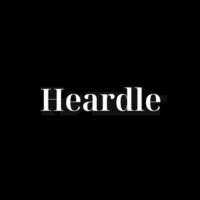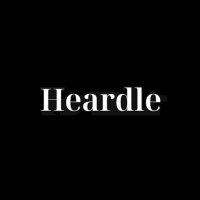
 It might surprise some Ross on Radio readers to hear Heardle and the Lost Factor mentioned in the same sentence. Heardle is the two-month-old British “name-that-tune” variant on the game Wordle that has been phenomenal in its own way. The Lost Factor divides old chart points by current radio spins to calculate those once-big hits that have become obscure with time. Where would they overlap?
It might surprise some Ross on Radio readers to hear Heardle and the Lost Factor mentioned in the same sentence. Heardle is the two-month-old British “name-that-tune” variant on the game Wordle that has been phenomenal in its own way. The Lost Factor divides old chart points by current radio spins to calculate those once-big hits that have become obscure with time. Where would they overlap?
At this writing, they have not. Heardle’s clues have included “Dancing Queen,” “Like a Virgin,” “(I Can’t Get No) Satisfaction,” and “I Wanna Dance with Somebody (Who Loves Me).” Yesterday’s clue was “I Love Rock & Roll.” “It’s too easy for us,” tweeted one radio person. Shortly thereafter, Questlove, who became Heardle’s celebrity influencer, weighed in along similar lines. (The April 28 “clue,” reminiscent of Heardle;s April Fools game, is a seeming response.)
So far, I’ve considered a song “lost” if its Lost Factor is higher than a 1.0. So far, no song heard in Heardle has had a higher number than 0.7, although that doesn’t count the 17 songs so far — roughly a quarter of the clues — that never made the Billboard Top 100 songs for a given year and thus have no Lost Factor. Yet, there have definitely been clues that were hard enough to generate online grumbling.
The makers of Heardle plan to release online stats about difficulty, but it is already possible to glean some generational differences both from the clues I’ve seen discussed or complained about on social media, as well as from Shazam stats. All 14 clues for the last two weeks have shown up on Shazam for that week, and it’s telling which songs people needed more help with. A lot of the recent clues also speak to the changing nature of “what is a hit.”
Heardle creator Omakase Studio is UK-based, and you can definitely tell that from some of the choices. Annie Lennox’s “Walking on Broken Glass” endured to some extent on AC radio there; in the U.S., it was a not-quite-real hit in 1992, during Top 40’s desperate hours when pure pop was overshadowed by almost every other genre. “Walking on Broken Glass” reads as “lost” to most radio people now, but it never made the year-end Top 100 in America.
There are other giveaways. “I Bet You Look Good on the Dance Floor” by Arctic Monkeys was a cultural moment in the UK; here it’s “Do I Wanna Know” that any Alternative radio veteran or listener heard as a current for two years. Mark Ronson hadn’t yet broken through in America with “Uptown Funk” when “Valerie,” essentially an Amy Winehouse record during her peak stardom, became a radio staple. “Teenage Dirtbag” by Wheatus was an Alternative hit here, but a mainstream pop smash there.
The Omakase Studio people say they don’t have an age target in mind, but if there’s a single person signing off on final song choices, I’d guess them to be somewhere in their mid-30s, where you can have heard enough older songs to choose “Got to Be Real” by Cheryl Lynn or “Never Too Much” by Luther Vandross — songs that are sadly not as omnipresent as “I Love Rock & Roll” (but not lost either). That person might also still make the effort to keep current on music, explaining how “Streets” by Doja Cat became one of the early clues. The repertoire also reflects those songs that read as hits to the current generation — e.g., “Jolene” by Dolly Parton — even if they weren’t pop-radio songs when new.
When I see my radio friends stumped by a clue, it’s nearly always those 2000s songs that had a cultural presence but not one on pop radio: Koffee’s Afro/Caribbean “Toast,” for instance. I managed to figure out “Black Skinhead” by Kanye West — heavily written about when it was new in 2013 but receiving zero U.S. radio spins now. But Daft Punk’s “Harder, Better, Faster, Stronger” stumped me. I heard it in 2001, but I only really know it as sampled by West for “Stronger.”
There have also been the trick questions that have caused a certain amount of online annoyance: expecting players to know “Wonderwall” by Oasis from the cough that precedes the familiar intro (actually at the end of the previous song on the album, apparently) or “Wannabe” by Spice Girls from the chuckle that comes before “so tell me what you want.” Those songs are megahits here, but even bigger at home. Again, to a 35-year-old Brit who experienced those songs by playing the album, not just hearing them on the radio, those might seem like fair questions. (Then again, around the same time, Led Zeppelin’s “Immigrant Song” also began with interstitial noise.)
These are the last two weeks of Heardle clues and where they ranked on Shazam last week. As is the case overall, the Shazam figures here likely reflect both people trying to game the Heardle game and who just wanted to bookmark songs. So an almost-hit like “My Oh My” might be one of the least-searched songs for the week because contemporary listeners still heard it plenty, or possibly because older listeners just threw their hands up.
Two weeks ago:
- Cheryl Lynn, “Got to Be Real” (No. 11)
- Koffee, “Toast” (21)
- Fatboy Slim, “Praise you” (42)
- Oasis, “Wonderwall” (57)
- Red Hot Chili Peppers, “Californication” (61)
- Camila Cabello f/DaBaby, “My Oh My” (63)
- Pink, “Get the Party Started” (99)
Last week:
- Arctic Monkeys, “I Bet You Look Good on the Dancefloor” (No. 27)
- Mark Morrison, “Return of the Mack” (33)
- Shakira, “Whenever, Wherever” (45)
- Annie Lennox, “Walking on Broken Glass” (52)
- Lauryn Hill, “Ex-Factor” (64)
- Harry Styles, “Adore You” (68)
- Snoop Dogg & Wiz Khalifa f/Bruno Mars, “Young, Wild & Free” (114)
These are the songs with the highest Lost Factor, based on airplay at monitored BDSradio stations earlier this month:
- Doja Cat, “Streets” (0.7 — as the year-end top 100 becomes less reliant on major airplay hits, it was No. 67 for the year and got 47 spins last week);
- Spice Girls, “Wannabe” (0.6)
- DJ Jazzy Jeff & Fresh Prince, “Summertime” (0.5)
- Destiny’s Child, “Independent Women” (0.5)
- John Legend, “Ordinary People” (0.4)
And here are the Heardle clues with the least airplay, regardless of Lost Factor:
- Kanye West, “Black Skinhead” (zero spins)
- Wheatus, “Teenage Dirtbag” (13)
- Mark Ronson, “Valerie” (14)
- Arctic Monkeys, “I Bet You Look Good on the Dancefloor” (16)
- Koffee, “Toast” (28)
(Update: The day after this article was initially published, the clue was Candi Staton’s R&B classic “Young Hearts Run Free,” a top 5 U.K. hit, but only No. 20 here. That song would be tied for fourth with 16 spins. Even then, because it had few year end points, its lost factor is 0.7.)
It’s worth noting that after “I Love Rock & Roll,” Questlove, who became the game’s celebrity endorser early on, took to Twitter to suggest that he create his own more challenging version, an idea which many followers liked. Maybe there’s an announcement of a celebrity curator in the offing.
Heardle is cool—-but there is no middle ground—-either it’s too easy and I get it in 1 sec or some gen z jawn I dunno. @Heardle_app I wanna do a Questo edition in which I really challenge music heads #Heardle #60
— a Rug In Percussion? (@questlove) April 27, 2022
Then again, a more challenging game already exists, actually. It’s SongPop, which I wrote about when it became phenomenal nearly a decade ago. If it’s intros you want, SongPop has multiple “just the intros” playlists, but they also have hundreds of others. I don’t play SongPop as obsessively as I did at the time, but if you or Questlove would like to challenge me, look for me @RossOnRadio.



